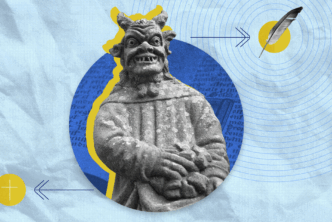The seventh chapter of my book The World Turned Upside Down marks the transition of Stranger Things from season one to season two. Basically, chapter seven takes us from before Eleven’s sacrifice to after Eleven’s sacrifice. The initial episode of season two sets the tone for this transition.
You can sum it up it in one sentence: Nothing will ever be the same.
Grappling with loss
Season two conveys the theme of loss by subversion. We hear Oingo Boingo’s “Just Another Day” playing in the background while we’re watching Hopper discover it isn’t just another day. For the boys in the show, Eleven’s surrogate family in Season one, her loss is crushing, especially to Mike. Viewers know as well that Eleven’s sacrifice leaves them all vulnerable to whatever malevolence will emerge from the Upside Down in this new season.
The opening of season two lays the groundwork for Stranger Things’ version of ongoing spiritual warfare. It providentially captures the mood and the situation of the disciples after the crucifixion. The loss of their teacher is devastating, leaving them vulnerable to all the enemies of Jesus since they were his followers. Life will never be the same for any of them.
Since they believed Jesus was the Messiah, the Son of God, life wasn’t supposed to be ever the same—but not like this, living out their days in fear, regret, and depression. That’s all going to change, of course, but they don’t expect that.
A changed life
It is telling that, despite Eleven’s absence, all the heroes of the show are confronted with evil and respond with true hearts. The awful events of season one have left lingering threats, but the characters show no moral ambiguity about what side they’re on and how they are loyal to each other and Eleven’s memory.
That’s an important trajectory for thinking about the gospel and its effect on those who believe. The New Testament, in fact, judges believers in terms of their profession. Life shouldn’t be the same once the gospel is understood and embraced. But that doesn’t mean the Christian life will be easy.
Believers will still struggle with sin (Paul, John, and James are completely honest about that in the New Testament). There will be internal conflict with the flesh—the old patterns of life and thought. The New Testament describes this as the war between the flesh and the spirit. Nevertheless, believers will show fruit. That is, their lives will convey the internal change that comes with being indwelt by the Holy Spirit.
The struggle with sin
Tragically, in my experience, these clear teachings of Scripture get confused by many believers. Many parse the struggle with sin as evidence that they might not be a believer. That’s precisely the opposite of what it means. If you are resisting and struggling, the Bible says that’s evidence of new life within. The key word there is “struggle.” An unbeliever wouldn’t care; there would be no struggle.
The struggle, though, isn’t a game or strategy for earning salvation. That’s another problem within the church. In my own Christian life, this was something I had to deal with. My first Christian context as a new believer was a church that preached hard against sin. I’m actually grateful for that now, but there were times when I wondered if God loved me as much as He did when my faith was new. I wondered that because of my failures in struggling against sin.
If you grasp the gospel clearly, that’s a theological absurdity. In my head, I had infected the gospel with my performance. I’d manufactured a different gospel in my own heart. A lot of Christians do that.
Scripture is clear, though, in Romans 5:8 that “while we were yet sinners, Christ died for us.” Before we had any thought of being godly, resisting sin, or pleasing God, Christ died for us because God loved us. That’s what John 3:16 says. God’s love for us isn’t stimulated or maintained by our performance. While we were yet sinners, God loved us and sent Jesus to sacrifice himself to save us.
The bottom line is that since salvation cannot be earned by works—by moral perfection, which is, of course, impossible—it cannot be lost by moral imperfection. We will fail at times in the struggle against sin, but God loved us before we even cared about struggling.
The characters of Stranger Things are not in ideal emotional or psychological places after Eleven’s sacrifice. They are struggling. But their orientation against evil is true. They weren’t going back to life before Eleven. They’d been changed, and that change would be evident.
***
This post is adapted from Michael Heiser’s new video series, The World Turned Upside Down, which examines gospel truths illustrated in the TV show Stranger Things. At times in the excerpt and video, Mike references chapters in his book, also called The World Turned Upside Down. Learn more about this special project and order the book.





